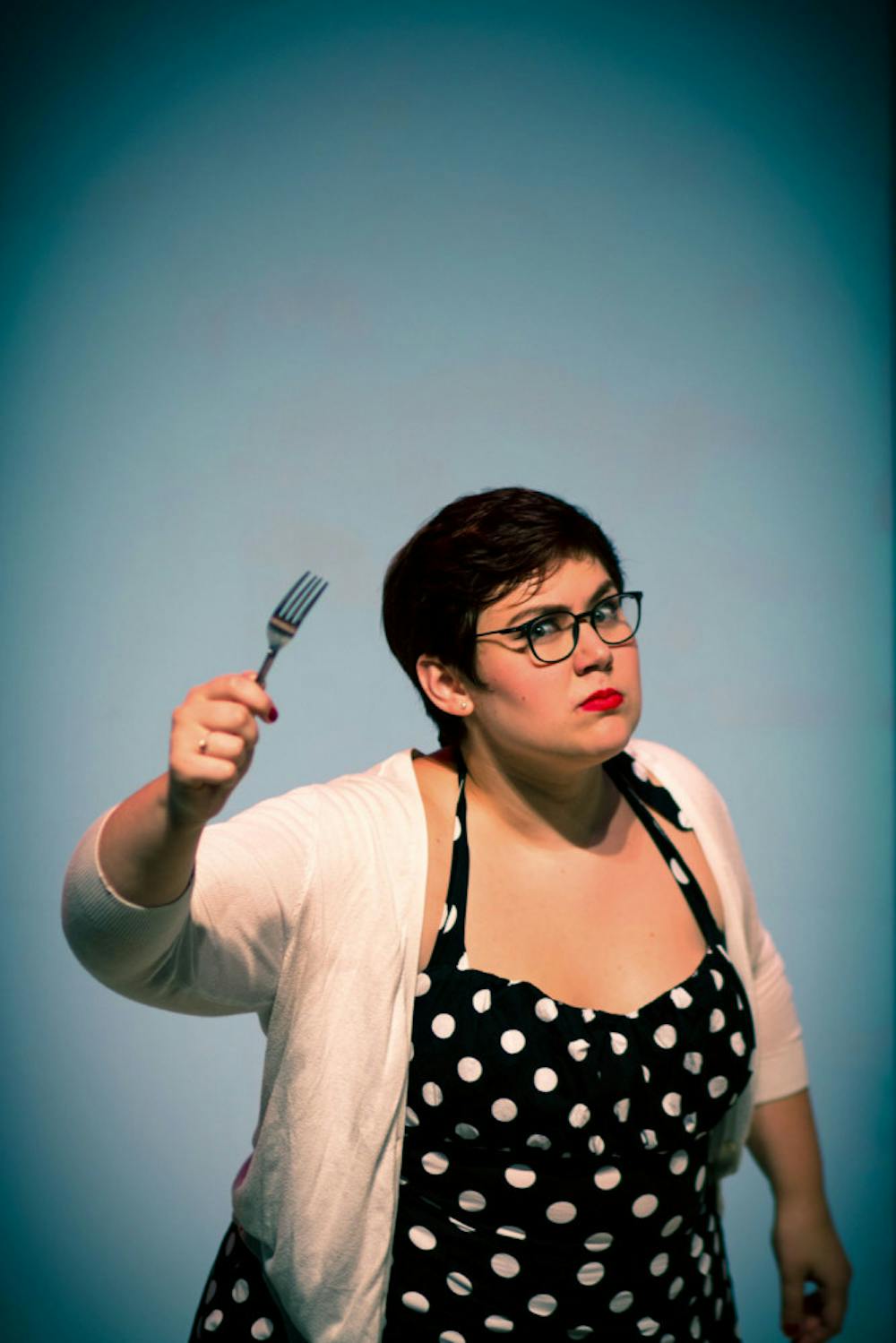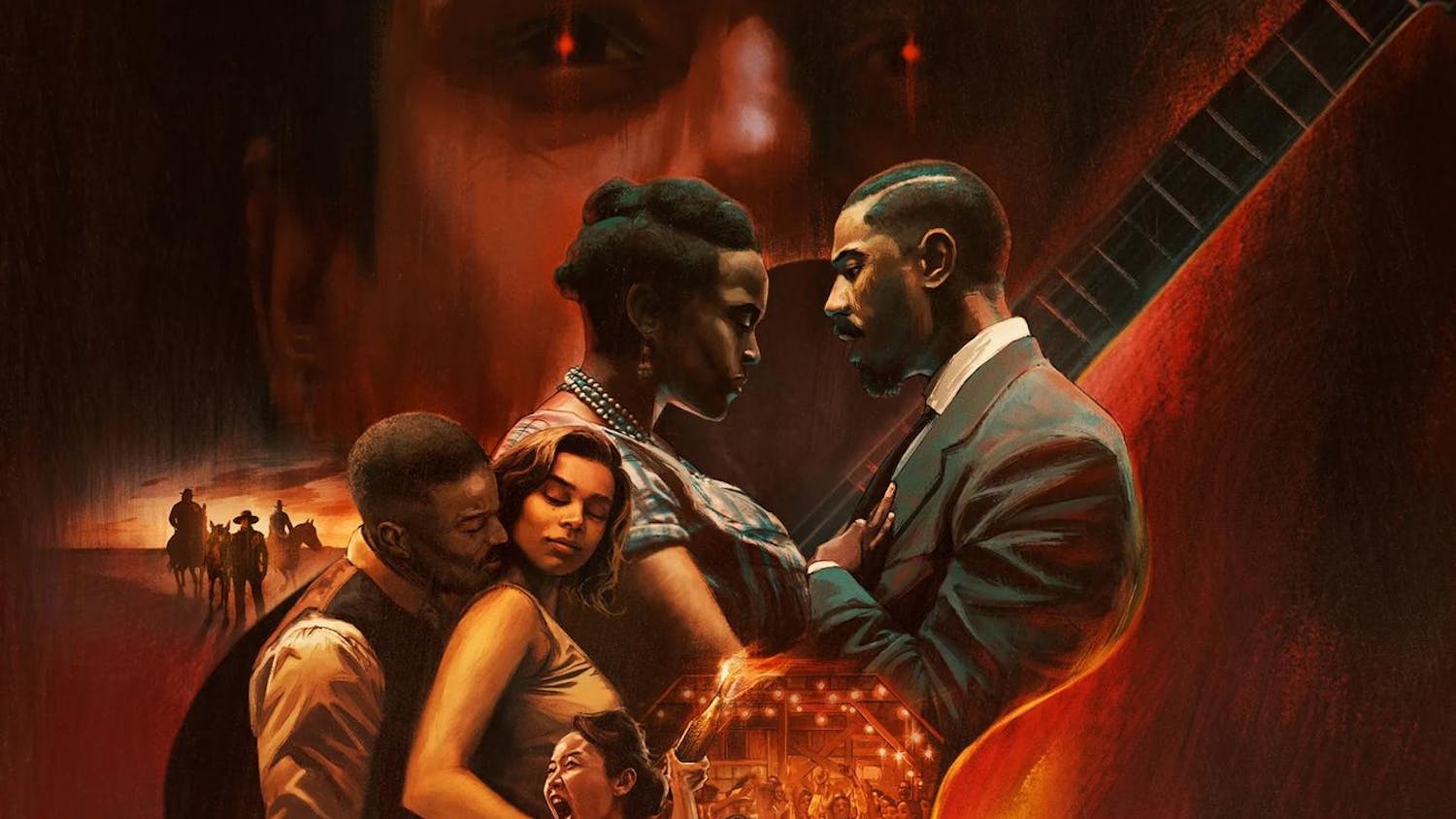Five saucy, self-described “widows” are living in an idyllic, patriarchal 1950s suburban world, and boy are they “dealing with it.” By virtue of invitation to the annual quiche breakfast of the Susan B. Anthony Society for the Sisters of Gertrude Stein, audience members in the Production Workshop Downspace are also “dealing with it,” even while attempting to keep up with the performance’s dizzying comedic absurdism for over an hour.
The PW theater performance “Five Lesbians Eating a Quiche” ran for four shows this past weekend and was directed by Kayla Kirk ’19.
Stage lighting illuminated a cheery 1950s kitchen — picture your grandma’s needlepoint and rooster-themed everything. Designed by Zachary Silberberg ’18, a Herald cartoonist, the set was a domestic wonderland; its cuteness only compromised by what appears to be a heavy, bolted metal door — the kind that belongs in a submarine or a fallout shelter. Three chipper women clothed in boldly patterned, conservative brunch attire burst onto the stage, eager for their annual “quiche” breakfast. “Oh my!” they exclaimed to one another shrilly with somewhat overwhelming vigor. “Hello! How are you?!”
Revolving around an egg-and-vegetable dish that contains no meat, the sisters’ all-female “no men, no meat, all manners” “quiche” breakfast is clearly no ordinary brunch. Enjoying each other’s presence, flirting with double entendres and certainly never eating meat, the actors’ commitment to seeming genuinely in lust with the breakfast dish was impressive and entertaining, though the script itself could probably have benefitted from some comedic variety.
Following along with the “sisters” improbable lunch, the audience became acquainted with one quirky member after another: Goofy Dale has a troubled past and harbors a deep distrust of men; sweet, simple-minded Wren only wants the best for her sisters; fork-tongued southern belle Lulie, the society president, demonstrates a bold physicality on stage that doesn’t waver from start to finish; British Ginny is always at odds with the propriety expected of her; and Vern, clever and brazen, never fails to put the team on her back.
Despite certain comedic shortcomings, the audience was engaged and laughing throughout the performance due to the dynamic and interactive efforts of the cast. Performance-goers were handed nametags as they walked into the Downspace to signify that they, too, were members of the Sisterhood. People in the front row were called out and directly addressed on occasion, and one lucky audience member, whose nametag read “Marjorie,” had the privilege of being spotlighted and shamed at regular intervals — the story goes that Marjorie dared to bring a sausage quiche to last year’s meeting and had been promptly ousted from the Sisterhood’s inner sanctum.
At moments when audience members assumed something shrewd was about to be said about domesticity and sexuality in 1950s United States, the absurdity intensified. Alarms sounded, signaling a Soviet nuclear attack, and the apocalypse was suddenly upon the sisters. Hysteria, madness and more shrill cries ensued. The ludicrous cacophony was successful due to its flawless execution and sheer situational improbability. Ninety-something closeted lesbians were stuck in a recently refurbished community center basement with exactly enough rations to get them through the nuclear fallout.
Its success largely rested on the brilliant performances of Vern, played by Luna Floyd ’19, and Lulie, played by Haley Wong ’20, whose pregnancy — with a boy — further complicates life in the bunker for the Sisterhood.
But the performance also had powerful but fleeting moments of gravitas, including a hope that the legalization of gay marriage will come to fruition as “soon” as the 1960s, which the audience knows to be painfully untrue.
Audience members emerged from the PW slightly exhausted and a little sweaty from all the muscle clenching that reflexively occurred every time the ladies denied their expectations. Though weary, the play’s reception was primarily positive. The jam-packed joke density — imagine laughing as much as you laughed in “Bridesmaids” — and all five actors’ gleaming enthusiasm managed to redeem the performance for its less stellar aspects. The play was written by two men, which is a tad ironic considering the play’s focus on the female experience in the 1950s. Still, it’s refreshing in its own way, demonstrating and celebrating the many dimensions of the lesbian identity without leaning on referential cynicism that so frequently underwrites contemporary comedies.





